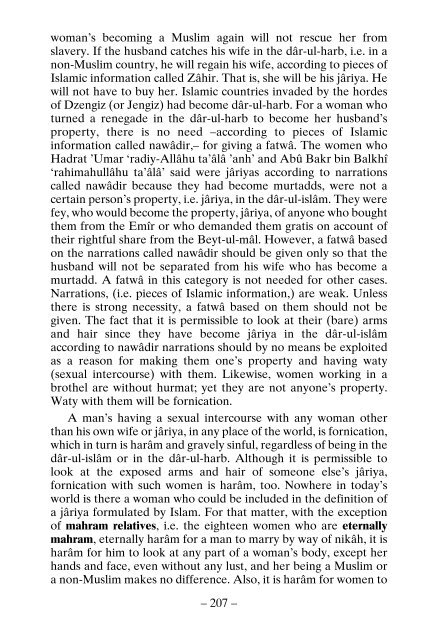O Son !
THE BOOK ‘O SON’ Al-hamdu lillâhi Rabbil ’âlamîn. Wa-s-salâtu wa-s-salâmu ’alâ Rasûlinâ Muhammadin wa Âlihi wa Sahbihi ajma’în. 1– O son! Collecting from books written by the scholars of the Hanafî Madhhab three hundred and sixty hadîth-i-sherîfs and forty-four khabars and also the seven essentials and the five rukns and the seven wâjibs and the fourteen sunnats and the twenty-five mustahabs and the fourteen mufsids of namâz, I have explained them for you. Adapt your acts and deeds to these teachings so that you attain fayz and nejât (salvation)! 2– Also for your information, I have collected a thousand and ninety âdâb (adabs) for you and for other young Muslims like you. If you adapt your actions and acts of worship to these teachings, they will be sufficient for you. If you laze, disobey Allâhu ta’âlâ and cease from these practices and manners, you will be afflicted with slavery and disgrace in the world and subjected to torment in the world to come. If you live up to them and advise your Muslim brothers to do the same, it will be useful for you. They will say blessings over you. And Haqq ta’âlâ will accept their invocations. For, a slave will be pardoned on account of another slave’s invocations for them.
THE BOOK ‘O SON’
Al-hamdu lillâhi Rabbil ’âlamîn. Wa-s-salâtu wa-s-salâmu ’alâ
Rasûlinâ Muhammadin wa Âlihi wa Sahbihi ajma’în.
1– O son! Collecting from books written by the scholars of the
Hanafî Madhhab three hundred and sixty hadîth-i-sherîfs and
forty-four khabars and also the seven essentials and the five rukns
and the seven wâjibs and the fourteen sunnats and the twenty-five
mustahabs and the fourteen mufsids of namâz, I have explained
them for you. Adapt your acts and deeds to these teachings so that
you attain fayz and nejât (salvation)!
2– Also for your information, I have collected a thousand and
ninety âdâb (adabs) for you and for other young Muslims like you.
If you adapt your actions and acts of worship to these teachings,
they will be sufficient for you. If you laze, disobey Allâhu ta’âlâ
and cease from these practices and manners, you will be afflicted
with slavery and disgrace in the world and subjected to torment in
the world to come.
If you live up to them and advise your Muslim brothers to do
the same, it will be useful for you. They will say blessings over you.
And Haqq ta’âlâ will accept their invocations. For, a slave will be
pardoned on account of another slave’s invocations for them.
You also want an ePaper? Increase the reach of your titles
YUMPU automatically turns print PDFs into web optimized ePapers that Google loves.
woman’s becoming a Muslim again will not rescue her from<br />
slavery. If the husband catches his wife in the dâr-ul-harb, i.e. in a<br />
non-Muslim country, he will regain his wife, according to pieces of<br />
Islamic information called Zâhir. That is, she will be his jâriya. He<br />
will not have to buy her. Islamic countries invaded by the hordes<br />
of Dzengiz (or Jengiz) had become dâr-ul-harb. For a woman who<br />
turned a renegade in the dâr-ul-harb to become her husband’s<br />
property, there is no need –according to pieces of Islamic<br />
information called nawâdir,– for giving a fatwâ. The women who<br />
Hadrat ’Umar ‘radiy-Allâhu ta’âlâ ’anh’ and Abû Bakr bin Balkhî<br />
‘rahimahullâhu ta’âlâ’ said were jâriyas according to narrations<br />
called nawâdir because they had become murtadds, were not a<br />
certain person’s property, i.e. jâriya, in the dâr-ul-islâm. They were<br />
fey, who would become the property, jâriya, of anyone who bought<br />
them from the Emîr or who demanded them gratis on account of<br />
their rightful share from the Beyt-ul-mâl. However, a fatwâ based<br />
on the narrations called nawâdir should be given only so that the<br />
husband will not be separated from his wife who has become a<br />
murtadd. A fatwâ in this category is not needed for other cases.<br />
Narrations, (i.e. pieces of Islamic information,) are weak. Unless<br />
there is strong necessity, a fatwâ based on them should not be<br />
given. The fact that it is permissible to look at their (bare) arms<br />
and hair since they have become jâriya in the dâr-ul-islâm<br />
according to nawâdir narrations should by no means be exploited<br />
as a reason for making them one’s property and having waty<br />
(sexual intercourse) with them. Likewise, women working in a<br />
brothel are without hurmat; yet they are not anyone’s property.<br />
Waty with them will be fornication.<br />
A man’s having a sexual intercourse with any woman other<br />
than his own wife or jâriya, in any place of the world, is fornication,<br />
which in turn is harâm and gravely sinful, regardless of being in the<br />
dâr-ul-islâm or in the dâr-ul-harb. Although it is permissible to<br />
look at the exposed arms and hair of someone else’s jâriya,<br />
fornication with such women is harâm, too. Nowhere in today’s<br />
world is there a woman who could be included in the definition of<br />
a jâriya formulated by Islam. For that matter, with the exception<br />
of mahram relatives, i.e. the eighteen women who are eternally<br />
mahram, eternally harâm for a man to marry by way of nikâh, it is<br />
harâm for him to look at any part of a woman’s body, except her<br />
hands and face, even without any lust, and her being a Muslim or<br />
a non-Muslim makes no difference. Also, it is harâm for women to<br />
– 207 –

















